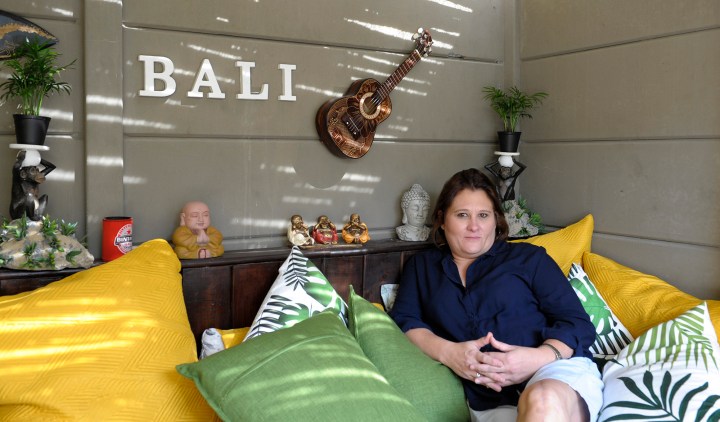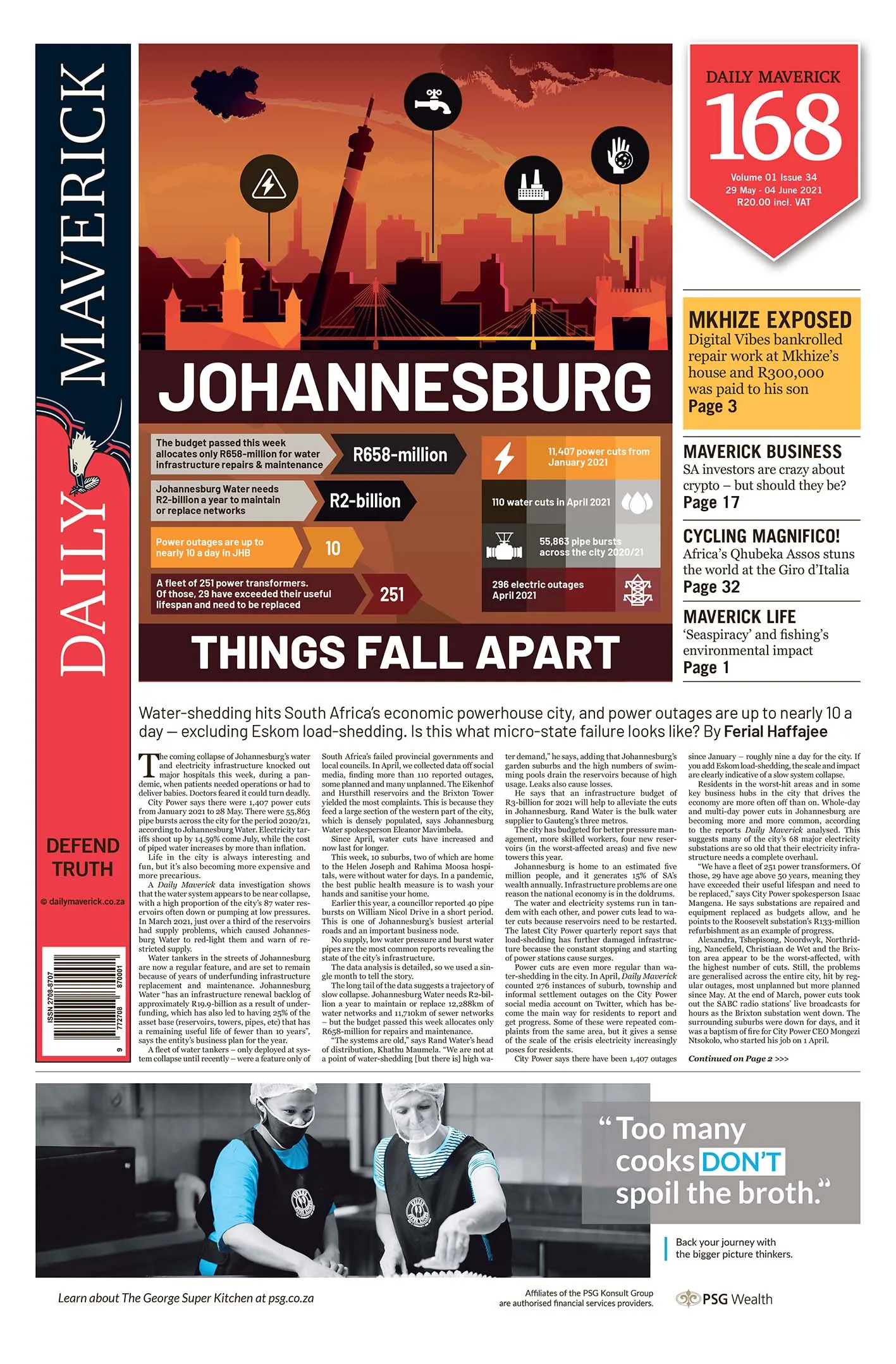DAILY MAVERICK 168
Tara Gerardy: Finding real solutions to treating drug dependency

Tara Gerardy knows only too well that abstinence is not a golden ticket. Her personal journey with prescription drugs gives shape to her mission to keep others from slipping into the shadows of addiction.
First published in the Daily Maverick 168 weekly newspaper.
Tara Gerardy knows that you can’t change people; you can only present them with different choices – and the support to make those choices viable. Paying it forward can’t come with strings attached.
Gerardy is the Cape Town-based national project manager for TB HIV Care’s People Who Inject Drugs (PWID) programme.
She’s had her fair share of blocks in life, but also breakthroughs. It’s this tension that keeps her focus sharp when it comes to challenging the stigma faced by PWID and pushing back on weary thinking of what solutions and support for drug dependency and disorder should look like.
Gerardy became dependent on opiates when she was recovering from a series of knee operations that started about 20 years ago. In the years that followed, she moved away from family and friends, relocating to Ireland.
When she suffered a back injury there, it landed her in hospital for surgery. Post-operative care for that procedure included a prescription of OxyContin, the morphine-based, slow-release pain medication.
It’s a drug that’s known to cause euphoric spikes followed by a crash of pain, making it a drug primed for overuse and addiction.
“It took me back to square one, and OxyContin became my nemesis – it kind of just took over. You get high and eventually you need to keep taking Oxy just to feel okay,” says Gerardy.
It took a visit back to South Africa for her to start confronting that she had a substance use problem. Family and friends noticed, then a chance reading by a fortune teller pushed her to get a medical check-up. The doctor’s report came as the “big, big fright” she needed to get help.
“I really didn’t think I had a problem; it wasn’t real to me and I kept fighting back all the time. I also am not the kind of person who goes to fortune tellers, but this person was spot on about everything and it convinced me to check things out. That’s when the doctor confirmed that my liver was packing up and I could die within years,” she says.
“I knew I didn’t want to spend the rest of my life with [an] opiate-use disorder; I wanted more for myself. I went back to Ireland, got into hospital and started a methadone treatment programme,” she says.
Methadone is used for opiate substitution therapy and it took four months for Gerardy to complete her treatment. She’s been addiction free for 11 years. “I was aware of [opiate substitution therapy] but I always felt that abstinence was the only real solution to dependency before I went through my own experience.
“I knew, after my treatment, that I wanted to come back to South Africa and I wanted to learn more about addiction and about methadone treatment so I enrolled to study at UCT for a post-grad diploma in addictions care,” she says.
She also started work at Hope House in Cape Town. It gave her the grounding in counselling and, later, outreach.
Gerardy also helped introduce a harm-reduction programme there. It shifted her perspective on the value of other treatment options beyond abstinence as an imagined gold standard.
“You have to look at what’s caused the symptoms and the dependency or disorder, and then you need to remember that you are dealing with people, not addiction.
“People just want to be seen; they just want a few minutes of your time when you are fully present, treating them like a person, not the disorder,” she says.
When Hope House ran into a funding crisis for its programme, she joined TB HIV Care, which was setting up a programme focused on psychosocial services for PWID.
People who inject drugs are sometimes forced to reuse or share needles, raising the risk of spreading blood-borne diseases, including HIV and hepatitis C.
Over four years, Gerardy built up a psychosocial counselling department that started as two drop-in centres in the city.
Today, it has a growing national footprint, including branches in Durban and Port Elizabeth.
“We are able to offer a rehab solution if that’s what clients are ready for. Some people will continue to use drugs; it’s helping them manage that. We also offer harm reduction and counselling. There’s also a focus on linking clients, many of whom are homeless or jobless, to healthcare,” she says.
Raising the profile of people who are overlooked, stigmatised or written off can sometimes feel like being thrown against the ropes, over and over again. The clients themselves can sometimes be working an angle, overtaken by the hustle to find their next fix. For Gerardy, it means managing boundaries and expectations – not giving up on people who need help.
“There were people who didn’t give up on me, so I can’t give up on them,” she says.
Gerardy says the fight is for more resources and facilities. It’s a skilled balance of exerting pressure on authorities while soothing them enough to get buy-in for interventions such as a needle-exchange programme.
Detractors still argue that needle and syringe programmes normalise or enable drug use. The challenge for Gerardy is not to cleave critics from their beliefs so much as it is to demonstrate the potential to reduce the spread of disease and the public health benefits of having vulnerable communities in a safety net, rather than defaulting on treatment.
There’s the tough job, too, to sensitise broader society about myths and truths. Recovery from dependency and substance use disorders is by its nature marked by relapse – it’s hardly ever a certain forward trajectory.
Building awareness extends to healthcare professionals, too. Gerardy says they often hear of discriminatory clinic staff who tell PWID they’re “too dirty to be treated”.
She says it’s easy for nurses even to ignore that many PWID have become homeless and have limited access to shelters for a proper wash. “I have overcome my own battles and I know this world of what the drugs do to your body and your mind. But I know what can be achieved – that’s why we keep on working on our advocacy and on sensitising people and fighting for people’s rights to have a chance and that their voices are heard,” she says.
Gerardy says there were those who spoke for her when she couldn’t find her own voice. They are her family and friends. Spending time with them now is how she finds her reset button – it’s walks on the beach or whipping up a pot of her famed pasta Alfredo to share. There are also wedding plans on the horizon for Gerardy. Baby plans too, perhaps. The point is that she has a future to look forward to.
“Eleven years of being addiction free. It’s incredible; you get your life back,” she says. DM168
FIVE QUESTIONS:
What image is on your phone’s home screen right now?
It’s a picture of Harry, our border collie. I always have pictures of him on my phone.
What would you spend your last R100 on?
I don’t think I would spend it. I would hold on to it because I always feel like there’s another bigger emergency that I should be prepared for.
What’s the worst piece of advice you ever took?
That I shouldn’t study psychology or counselling, which is where my heart is and why I do the work I do today.
What’s the one thing you wish you’d learnt earlier on in life?
I wish I had learnt about boundaries and that I was more careful about who I trusted and let into my life.
Three books that have influenced your life?
A Million Little Pieces by James Frey. I am a useless reader so I have to name two people who have impacted my life instead: they are Shaun Shelly at TB HIV Care, who convinced me about harm reduction therapy; and my mom, Judy Gerardy, who I put through some grief. She’s taught me incredible life lessons and made sacrifices for me. DM168
This story first appeared in our weekly Daily Maverick 168 newspaper which is available for free to Pick n Pay Smart Shoppers at these Pick n Pay stores.




















 Become an Insider
Become an Insider
Comments - Please login in order to comment.